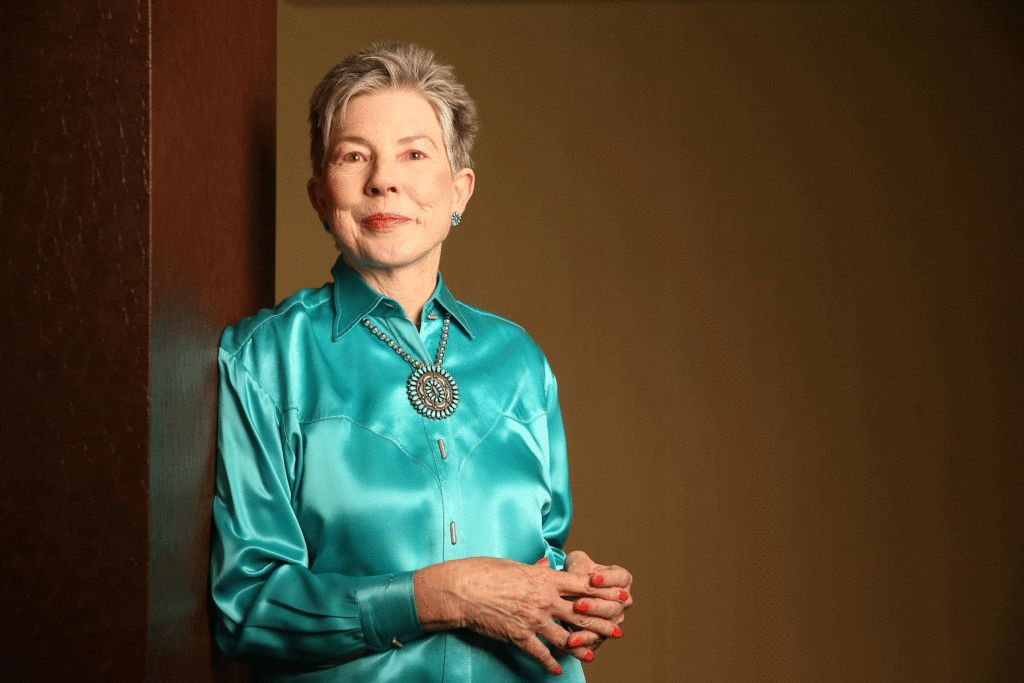The Influence of Martha Burk on Augusta National
Martha Burk is an influential women’s rights activist that is widely known for the disagreement beginning in 2002 with William “Hootie” Johnson, then chairman of Augusta National Golf Club, over admission of female members to Augusta National. Burk contended that hosting the Masters Tournament at a male-only club, constituted sexism because 15% of the club’s membership were CEOs, many of them Fortune 500 CEOs. Johnson characterized Burk’s approach as “offensive and coercive” and despite efforts to conflate the issue with sexism and civil rights, Johnson maintained the issue had to do with the rights of any private club.
- You were head of the National Council of Women’s Organizations, so can you tell me about your role and what you did there for that organization? How did you become the head of the council and how long did you serve in this position in the organization?
“I was the chair and the chief executive of the National Council of Women’s Organizations, which is the largest non-partisan women’s group. We dealt with things such as Planned Parenthood, United Church of Women and much more. We had over 110 groups. We are the largest coalition for women in the United States. We had a small staff but that was because we did not initiate anything by ourselves. We worked with outside groups and organizations that collaborated with us. I was elected by the member groups and I served for about six years before retiring.”
- What are you currently doing now to promote the game of golf for women?
“I am currently advising a couple of groups about the women’s tour at Trump National course and working towards the inclusion of African Americans and minorities in golf. The LPGA has always been controlled by men and it still is. The players do not seem inclined to run a vote…they do what the boys tell them to do and I think that’s unfortunate.”
“A number of players in the PGA try to advocate for minorities since they knew the history of race discrimination in golf. There was a long time at Augusta National when the caddies could only be African American and the players could only be white. In the ’90s, a golf club called Shoal Creek in Alabama when they first opened excluded African Americans from playing on their course. An important PGA tournament was gonna be held a Shell Creek, but it came out that they did not allow African Americans or women for that matter. Many sponsors threatened to pull out. Shoal Creek elected to let go of the tournament to continue discriminating. The USGA has always had a policy not to hold their section events at places that discriminate, but Augusta National seemed to be the exception to this controversy.”
- You sent a nine-sentence letter to Augusta National chairman William (Hootie) Johnson in which you challenged the club’s gender-restricted membership policies. Why did you feel the urge to take a stance and speak your mind about women’s rights and issues?
“It wasn’t really just about golf, but about discriminating against women in a high profile event. Females were barred from it and they could not be part of the “good ol boys club.” It sends a bad message and hurts women’s rights in general.”
- Can you give me an insight into the protest that occurred at one of the fields near Augusta National? Can you describe the scenery and your personal experience during that moment?
“The club barred us from the gates when we were protesting, which was illegal. Augusta National was found guilty and was fined because it was public property. I had bodyguards and a bulletproof vest on because I had received a lot of death threats. The field that we were protesting at was surrounded by apartments. People who were watching us were screaming all sorts of hate words at us. Guns were sold in Augusta in places like Walmart, so we were afriad. Sports illustrated ran a piece on it prior to tournament that “she ought to be shot.” But, you just gotta put one front in front of other.
- Since you are an advocate for women’s rights, especially when it comes to golf, do you believe there is a real issue when it comes to sexism on the course?
“I think it’s still continuing and it’s not anywhere near equal. This is a question you should ask: “Are the LPGA players require to share hotel rooms?” In many sports, the men get their own hotel rooms and the women are asked to share. I think the biggest issue with the LPGA is that they are feared of rocking the boat. They are afraid of going against the golf establishment and speak out but at the end of the day, they are the only one’s who can make a significant change.”
- Can you tell me about your book the Cult of Power: The Inside Story of the Fight to Open Augusta National Golf Club and How it Exposed the Ingrained Corporate Sexism that Keeps Women Down
“I was solicited by a publisher to write it and I accepted because I believe it’s an important subject to address. There’s a lot of valuable lessons in there that we can learn from. It’s been so successful that it’s used as a textbook at several universities for their gender studies class. It alsowas such a prominent subject in the media. Reporters always asked to interview me about what happened at Augusta. I wanted to get the fundamental message out and provide the official record of what happened.”
- As you probably know, sexism is still an issue in the golf industry to this day. Women are sexualized in many ways especially when it comes to golf magazines such as Golf Digest when they put some LPGA players on the front covers of their magazines wearing a bikini or a provocative outfit? How do you feel about that and do you think it needs to be addressed?
“It’s outrageous! Sports illustrated has been using the swimsuit issues for 25 years at least. But again whats gonna change that is the women. They gotta say we are not gonna do this. Nobody drags them to a photo shoot to put on a bikini. That is a personal decision and a decision of their agents. Women have to stand together or its not gonna change.”
- Are you planning on writing any additional books that address sexism in golf for this era in the golf world?
“The Cult of Power book is in its third edition right now. The most recent edition is called “your voice your vote.” It’s about political issues as they affect women. However there is a difference between women issues and the rights of women. Many people think it has to do with abortion etc. But, there are so many other issues such as taxes, social security and even international treaties.”
- Is there any advice you would like to give to young women who are aspiring to be on the LPGA tour but are afraid they will experience sexual or rude comments such as “oh i bet you can’t hit your driver far” or “you’re basically cheating because you are playing for the women’s tees?”
“It’s a long haul. I think when you go into a venue like that realizing what you’re up against is the first step. You have the ability to be a change agent. You have the responsibility to the people who come after you to be a change agent to try to recruit others into your cause. Billy Jean King, one of my good friends, talks in her books about how she changed tennis in terms of the prize money and the way women were treated. She recruited two women at a time until eventually there were hundreds of supporters. Women have to take over the LPGA and get these men off the board. I think they have maybe two or three women on the board, but I don’t think that’s enough. The players themselves are going to have to take this on and form another association. History shows that with other sports as well. That’s how you make change. I’m not even sure that the women in the LPGA have taken any steps. I met with the head of the LPGA on the Augusta National issue and he was very condescending.”
- How can we promote change in the golf industry today?
“Women’s sports don’t make enough money. No one is willing to give the women a chance. It’s complicated. For example, we went after the advertisers at Shoal Creek and they immediately pulled out. Advertisers pulled out of Augusta as well, but they made a deal they will come back next year when it blows over. Advertisers did not take women’s issues as seriously as black mens right.”



